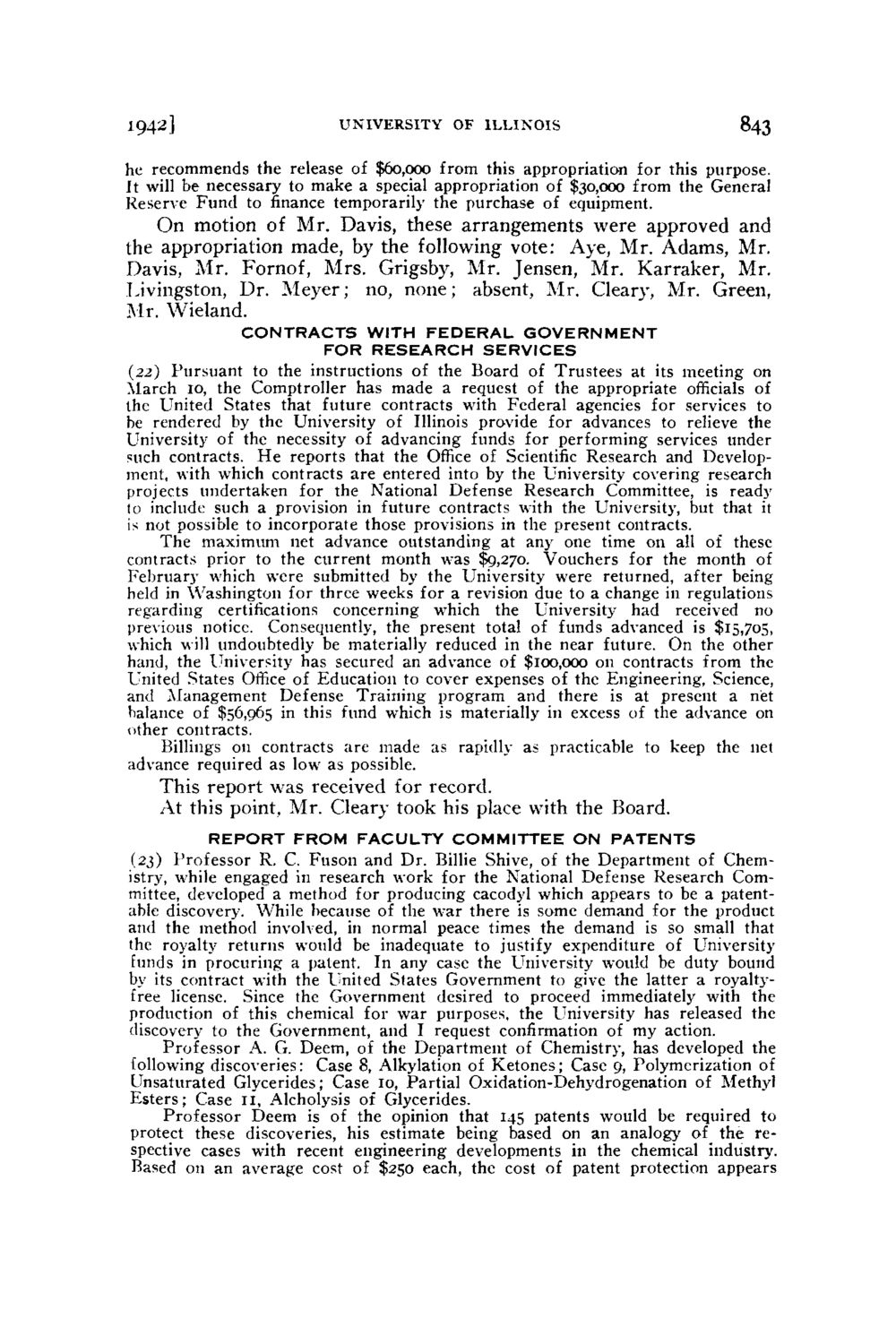| |
| |
Caption: Board of Trustees Minutes - 1942
This is a reduced-resolution page image for fast online browsing.

EXTRACTED TEXT FROM PAGE:
1942] U N I V E R S I T Y OF ILLINOIS 843 he recommends the release of $60,000 from this appropriation for this purpose. It will be necessary to make a special appropriation of $30,000 from the General Reserve Fund to finance temporarily the purchase of equipment. On motion of Mr. Davis, these arrangements were approved and the appropriation made, by the following vote: Aye, Mr. Adams, Mr. Davis, Mr. Fornof, Mrs. Grigsby, Mr. Jensen, Mr. Karraker, Mr. Livingston, Dr. Meyer; no, none; absent, Mr. Cleary, Mr. Green, Mr. Wieland. CONTRACTS WITH FEDERAL GOVERNMENT FOR RESEARCH SERVICES (22) Pursuant to the instructions of the Board of Trustees at its meeting on March 10, the Comptroller has made a request of the appropriate officials of the United States that future contracts with Federal agencies for services to be rendered by the University of Illinois provide for advances to relieve the University of the necessity of advancing funds for performing services under such contracts. H e reports that the Office of Scientific Research and Development, with which contracts are entered into by the University covering research projects undertaken for the National Defense Research Committee, is ready to include such a provision in future contracts with the University, but that it is not possible to incorporate those provisions in the present contracts. The maximum net advance outstanding at any one time on all of these contracts prior to the current month was $9,270. Vouchers for the month of February which were submitted by the University were returned, after being held in Washington for three weeks for a revision due to a change in regulations regarding certifications concerning which the University had received no previous notice. Consequently, the present total of funds advanced is $15,705, which will undoubtedly be materially reduced in the near future. On the other hand, the University has secured an advance of $100,000 on contracts from the United States Office of Education to cover expenses of the Engineering, Science, and Management Defense Training program and there is at present a net balance of $56,965 in this fund which is materially in excess of the advance on other contracts. Billings on contracts are made as rapidly as practicable to keep the net advance required as low as possible. This report was received for record. At this point, Mr. Cleary took his place with the Board. REPORT FROM FACULTY COMMITTEE ON PATENTS (23) Professor R. C. Fuson and Dr. Billie Shive, of the Department of Chemistry, while engaged in research work for the National Defense Research Committee, developed a method for producing cacodyl which appears to be a patentable discovery. While because of the war there is some demand for the product and the method involved, in normal peace times the demand is so small that the royalty returns would be inadequate to justify expenditure of University funds in procuring a patent. In any case the University would be duty bound by its contract with the United States Government to give the latter a royaltyfree license. Since the Government desired to proceed immediately with the production of this chemical for war purposes, the University has released the discovery to the Government, and I request confirmation of my action. Professor A. G. Deem, of the Department of Chemistry, has developed the following discoveries: Case 8, Alkylation of Ketones; Case 9, Polymerization of Unsaturated Glycerides; Case 10, Partial Oxidation-Dehydrogenation of Methyl E s t e r s ; Case 11, Alcholysis of Glycerides. Professor Deem is of the opinion that 145 patents would be required to protect these discoveries, his estimate being based on an analogy of the respective cases with recent engineering developments in the chemical industry. Based on an average cost of $250 each, the cost of patent protection appears
| |